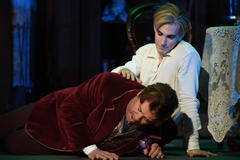| Opera Reviews | 28 April 2024 |
The ups and downs of Morrison's Oscarby Steve Cohen |
|
| Morrison: Oscar Opera Philadelphia February 2015 |
|
|
A clever new opening has Oscar Wilde taking a curtain call at the successful premiere of his comedy, Lady Windermere's Fan. Aside from that, there’s almost no look at the flamboyant Wilde at the height of his popularity. Thus we can’t adequately grasp the scale of his catastrophic fall. And that illustrates a major flaw in the drama. Oscar presents Wilde as a tragic hero and shows too little of his mischievous, wickedly playful side. Walt Whitman (baritone Dwayne Croft) serves as a master-of-ceremonies, narrates the story and tells the audience of Wilde’s successes. But we are being told; we are not shown Wilde at his glittering peak. Whitman’s appearance in the opera is a contrivance. The two men did meet when Wilde was on an American speaking tour in 1882, but Whitman died before the events depicted. The journalist Mallory Ortberg wrote that “Walt Whitman and Oscar Wilde almost certainly had sex in 1882, and that’s wonderful. This is like finding out Emily Dickinson once spent a weekend with Jane Austen.” Despite this unproven possibility, when the opera’s Whitman sings from heaven that Wilde will join the immortals it all seems rather distant. Also, if we take as a given that the opera is about Wilde’s later years, we’re still left to wonder why almost all of Act II shows Wilde in jail instead of portraying his life in Paris after his release. The act is a detailed indictment of the English penal system of the 1890s when I’d rather observe Wilde’s attempts to resume his literary career. The opera was conceived as a showpiece for the world’s most prominent counter-tenor, David Daniels, and Daniels’s singing is superb, displaying more power than we hear in baroque operas. Morrison wrote a nice aria for Daniels, “My sweet rose, my delicate flower,” which was greeted by respectful silence. It is that type of score, with no ascents to crowd-pleasing endings. Morrison’s model apparently is Benjamin Britten rather than Verdi. Like Britten, Morrison writes effective chorales and soliloquies that are internalized reflections by the characters. Two of Wilde’s friends are well played and sung by tenor William Burden and soprano Heidi Stober. Colorful orchestration and complex choral numbers make Oscar a pleasure to hear. Morrison’s vocal writing is graceful and he creates beautiful effects in the lower brass and woodwinds. One of the high spots is a chorus of male prisoners singing Morrison’s setting of Wilde’s poem, The Ballad of Reading Gaol. Another memorable moment is when the safe environment of a nursery, where Wilde found shelter, morphs into a courtroom where harmless toys become mocking accusers and a jack-in-the-box becomes a menacing judge. Wilde’s love affair with the youthful Lord Alfred Douglas (known as Bosie) precipitated Wilde’s downfall. Urged on by Bosie, Oscar brought Bosie’s father, the Marquess of Queensberry, to court on a charge of libel. That led to a trial where Wilde was sentenced to two years hard labor for “gross indecency.” The role of Bosie was played by a mute dancer (the slender young Reed Luplau). This device reminded us of Britten’s Death in Venice, where the part of the protagonist’s young infatuation was also assigned to a dancer. But the opera does not capitalize on the ambivalent and contradictory aspects of the Wilde-Douglas romance. Bosie fled to France before the trial. Then Bosie inherited £20,000 on the death of his father but he refused Oscar’s request for financial help. This version of Wilde sings that true nobility of soul can only be achieved through pain and sorrow. He appears to be without doubts, without anger, without regret that he had been manipulated; he is entirely a noble victim. (The complicated relationship of Wilde with Douglas would itself make a gripping opera.) Director Kevin Newbury paced the production smoothly, with handsome designs by David Korins. The rising young conductor Evan Rogister kept his large forces beautifully coordinated.
|
|
| Text ©
Steve Cohen Photo © Kelly & Massa |

 Opera Philadelphia has re-introduced this work which it co-commissioned with Santa Fe Opera, with major revisions, especially to its opening and closing scenes. The production at the Academy of Music has a new and massive two-story set.
Opera Philadelphia has re-introduced this work which it co-commissioned with Santa Fe Opera, with major revisions, especially to its opening and closing scenes. The production at the Academy of Music has a new and massive two-story set. 





